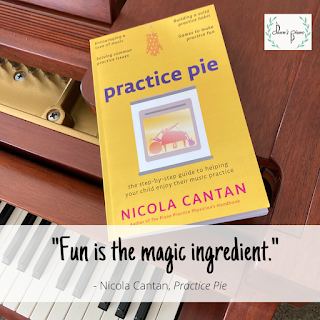Practice Pie - Book Review!
Practice Pie by Nicola Cantan is a step-by-step guide to helping your child enjoy their music practice. After I heard about it on a recent episode of the Piano Parent Podcast, I wondered if it might be something I'd want to recommend to my studio piano parents, so I grabbed a copy to check it out.
A few things I really liked: First, the book is short. At only 50 pages, it doesn't take long at all to read, making it perfect for busy piano parents. And at the same time it's to the point, and chock-full of encouragement and practical steps for piano parents to try with their piano kids in home practice. Nicola writes in a very conversational style, so it sort of feels like you're just having a chat with someone who has some really fun and helpful ideas.
You can probably tell from the title, but the book uses baking a pie as an analogy for practicing an instrument, from choosing the right pie dish, to each of the ingredients for the crust and filling, each element of the pie represents an element of practice. The comparison between pie and practice is fun, and I think it could be easy to include your piano kid in the discussion of making your own practice pie.
Some of the elements that I was really happy to see included in her practice pie are:
- Establishing a practice routine
- Creating a family music listening habit
- Acknowledging when music study gets hard or frustrating
- Setting attainable goals for each practice session
- Interleaved (layered) practice
"You might luck out and have one of those kids who manages to muddle through and find their own motivation and methods of practising. But I can tell you from experience that those kiddos are less than 1% of the population. And those that don't naturally go to their instrument to practise of their own volition or practise in constructive ways week after week and year after year are no less "talented" or "musical". They just need a little help."
And I think this is such an important idea, because so often in artistic endeavors we confuse the results we see from good practice with some sort of innate talent. Helping your kid establish an effective home practice routine is really one of the best things you can do for their music study after enrolling them in lessons.
If you want to learn more but you're on the fence, or maybe know that reading a book (albeit a very short one) is probably not going to happen right away for you, be sure to check out this interview the author Nicola Cantan gave on the Piano Parent Podcast in the meantime!
And to my studio parents, I have a copy of this book in the studio library that I'd be happy to loan out. Just let me know if you'd like to check it out!
